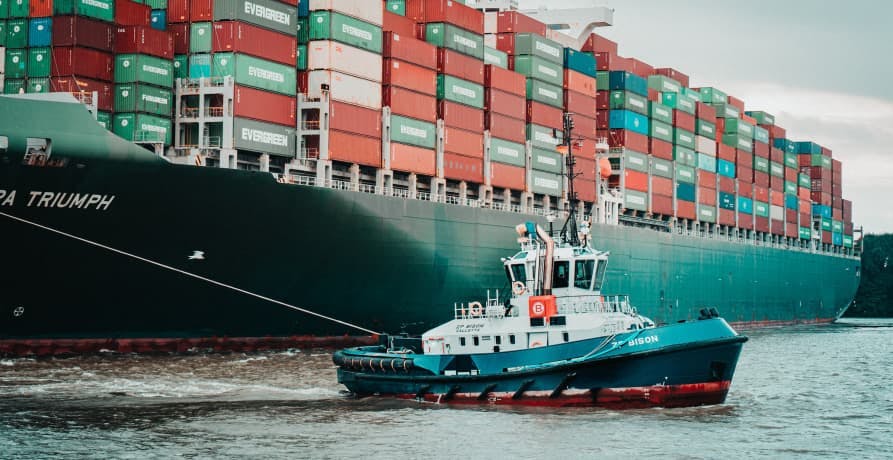
What are the 3 Pillars of Corporate Sustainability?
In this article, we'll explore what the 3 pillars of corporate responsibility are, why they're important, and how businesses can turn them into practical action.
ESG / CSR
Industries



Supply chain management is becoming more important as the movement towards worldwide sustainability kicks off, but why is traceability important for companies that want to instill good supply chain management?
Traceability allows companies to carefully follow the history of where their products have been. Think of it like a missing package or airline bag: if you’re trying to figure out where your package went, wouldn’t it be helpful to know its entire history and each place it was scanned before it got lost in the abyss of the postal service?
What is traceability, why is it important, and how can it help your company to improve its supply chain management?
When referring to supply chain management and sustainability, traceability refers to the capability to track and document the history or previous locations of processing of a product or event. Traceability usually relies on recorded data and records to ensure that these various steps and processes have been documented for future reference.
Traceability often makes use of technology, such as Radio-Frequency Identification (RFID), digital barcodes, or serial numbers to track the history of a product – much like a package in transit. This helps to provide a detailed history possible of where the product has been.
“Traceability is a formation of two words, “trace” and “ability” – and can mean different things depending on which industry the term traceability is being used in.”
👉 Traceability is further explained and defined in the ISO 9001 standard from the International Organization for Standardization.
Companies will often make use of a third-party software or assistance to help ensure that their traceability is functioning at the top of its game and ultimately to maximize their supply chain management.
Ultimately, traceability helps companies to be more transparent and make better decisions for their business – which all help to cultivate better sustainable practices and more efficient supply chain management.

Some of the main goals and benefits of traceability include:
Traceability allows companies to be held accountable for the history of the products. Think of it like a customer or credit card user who keeps adding it to their “tab” – or racking up a bill to pay later. Traceability helps companies to ensure they are aware of their responsibilities and debts when it comes to the potential impact of a product or service.
Keeping up to date with environmental regulations is becoming more challenging to keep track of than ever these days. Traceability can help companies to comply with many of the newfound strict standards they are required to follow, such as by helping companies to be able to provide various documentation to prove they are practicing the proper efforts.
Similar to the rest of supply chain management, risk management is a huge benefit of traceability – as it allows companies to backtrack if an issue is to occur. This can help companies make recalls and prevent future incidents with products. For example, traceability can help a company realize when an expired product was shipped out – and send out an email to all customers as soon as possible to avoid using the product and potential lawsuits.
Supply chain management and quality control usually go hand in hand, and traceability can help companies with this by helping to document all relevant information from how viable products are from manufacturing to shipment.
👉 Traceability is just one of the many ways that companies can improve their supply chain management.

Supply chain management is the process of ensuring that all raw materials are successfully transformed and shipped into products to be delivered. This requires active effort to make sure that suppliers are functioning at the most economical and environmentally friendly levels possible.
Supply chain management is important as it can help companies to deliver products quicker with more efficiency and higher quality. This can also help to reduce business costs and allow additional funding for companies to invest in other low-carbon technologies to further implement sustainability and drive emissions – such as a carbon capture and storage system.
Other benefits of supply chain management include reduced emissions, less risk of being accused of greenwashing, being able to comply with new environmental standards more easily, and avoiding a sudden supply shortage and the consequential impacts to be had on a business and its supply chain.
Supply chain management systems are usually broken down into five different parts: planning, sourcing, manufacturing, delivering, and returning. Planning in supply chain management refers to the development of a supply chain strategy, often personalized to the company drafting their supply chain specifically for their business and goals – whereas the other four parts of supply chain management help to further develop the rest of the supply chain management tactic to be implemented.
What does traceability have to do with supply chain management?

Traceability is crucial to supply chain management for a multitude of reasons. For instance, traceability can help ensure the quality of products is well monitored throughout the supply chain – as it requires products to be tracked and can help to determine any potential defects in a short amount of time. Benefits of traceability such as this can help to ensure customer satisfaction, product quality, and increase investor interest – all of which can help a company to succeed in both their sustainability and financial goals.
Another difficult aspect to cultivating an efficient and effective supply chain is making sure that companies stay up to date with all of the new environmental regulations being released. Thankfully, traceability can help with regulatory compliance – and also provide any documentation necessary to adhere to these new environmental standards being released. In addition to this, traceability can help to reduce business risks with the full-scope of history of products being documented.
However, one of the most imperative aspects and benefits of traceability in ameliorating supply chain management is that traceability can help to improve transparency – one of the most vital elements to any company looking to improve their sustainability or supply chain management. This is because traceability requires companies to be more cognizant of their product history and to create a paper trail that can then be provided when applying or seeking to follow other international sustainability standards – such as ISO standards.
Transparency results in companies developing greater trust with their customers, employees, and stakeholders – all of which allow for a more successful and sustainable business to operate as it can facilitate better communication across various business operations. In addition to this, traceability can help to improve ethical sourcing – which also helps to promote social responsibility and overall improved supply chain management.
Ultimately, traceability can help to improve supply chain visibility and allow companies to take accountability – which can help companies to promote overall sustainability, as traceability helps to improve supply chain management and address issues as they arise.
👉 Traceability can help companies to be proactive rather than reactive – which is key to cultivating a well-managed supply chain.

While traceability is one of the effective ways to ensure good supply chain management, it doesn’t come without its caveats. For instance, seeking to implement greater traceability will have to recruit the help of multiple stakeholders – all of which are likely to have a different preference on how to improve traceability. This means extreme compromise and planning is required to implement traceability across an entire supply chain. In addition to this, technology and infrastructure could be outdated or inconsistent across suppliers, financial matters or a general lack of resources could prevent the proper traceability tactics from being implemented, or difficulties in communication between stakeholders could all make implementing traceability challenging.
There are certainly many barriers when it comes to implementing greater traceability within a supply chain and company. However, this doesn’t mean that companies can’t make the effort to improve their traceability for the supply chain management.
First, companies should seek to improve their traceability by understanding all of the regulations they are required to comply with. After this necessary step is completed, companies can then develop a plan to create an actionable plan to improve their traceability. The best way for companies to successfully improve their traceability is to seek third-party assistance to help develop a personalized plan on how to best digitally label all products to encourage supply chain visibility and overall better supply chain management.
👉 Traceability is all about transparency, so regardless if your company chooses to seek the help of a third party to improve their traceability or not – it is imperative to encourage all suppliers throughout a supply chain to disclose their data, especially for stakeholders.
When it comes to improving supply chain management, there are more ways than one for companies to make their supply chains better. While traceability is a great tool to use and can help companies improve their supply chain management, there are a few other things to keep in mind. For instance, supply chain resilience is the process of building up your supply chain to be more durable in the midst of various crises: such as a natural disaster or financial difficulties. Greater supply chain resilience can be achieved by seeking to diversify your company’s supply chain, improve risk assessments, attempting new collaborations with suppliers and business partners, and making an effort to improve wherever possible.
Also, supply chain visibility is also a key way to improve supply chain management – as supply chain visibility can help to prevent business disruptions and advocate for the same kind of transparency to be achieved with implementing traceability into your company’s supply chain.
All of these tactics can help your company to build a more sustainable supply chain, but traceability remains as one of the best kept secrets to cultivating the supply chain of your company’s dreams.
If reading this article about why traceability is important to supply chain management has made you interested in reducing your carbon emissions to further fight against climate change – Greenly can help you!
It can be difficult to know where to start when it comes to improving supply chain management and traceability in your company, but don’t worry – Greenly is here to help you and your business manage your supply chain and many other environmentally friendly criteria. Book a demo with one of our specialists to learn more.
Greenly can help you make an environmental change for the better, starting with a carbon footprint assessment to know how much carbon emissions your company produces.